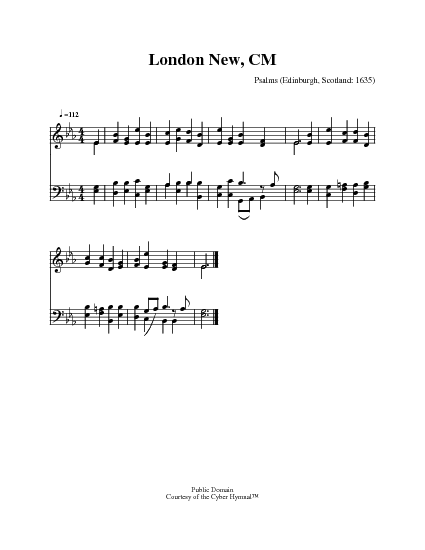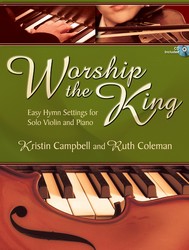- |
User Links
Access to the Throne of Grace by a Mediator

Come, let us lift our joyful eyes
Author: Isaac WattsPublished in 199 hymnals
Printable scores: PDF, MusicXMLAudio files: MIDI
Representative Text
1 Come, let us lift our joyful eyes,
Up to the courts above,
And smile to see the Father there,
Upon a throne of love.
Now we may bow before his feet,
And venture near the Lord:
No fiery cherub guards his seat,
Nor double flaming sword.
2 The peaceful gates of heavenly bliss
Are opened by the Son;
High let us raise our notes of praise,
And reach the almighty throne.
To thee ten thousand thanks we bring,
Great Advocate on high,
And glory to the eternal King,
Who lays his anger by.
Source: Laudes Domini: a selection of spiritual songs ancient and modern #476
Author: Isaac Watts
 Isaac Watts was the son of a schoolmaster, and was born in Southampton, July 17, 1674. He is said to have shown remarkable precocity in childhood, beginning the study of Latin, in his fourth year, and writing respectable verses at the age of seven. At the age of sixteen, he went to London to study in the Academy of the Rev. Thomas Rowe, an Independent minister. In 1698, he became assistant minister of the Independent Church, Berry St., London. In 1702, he became pastor. In 1712, he accepted an invitation to visit Sir Thomas Abney, at his residence of Abney Park, and at Sir Thomas' pressing request, made it his home for the remainder of his life. It was a residence most favourable for his health, and for the prosecution of his literary… Go to person page >
Isaac Watts was the son of a schoolmaster, and was born in Southampton, July 17, 1674. He is said to have shown remarkable precocity in childhood, beginning the study of Latin, in his fourth year, and writing respectable verses at the age of seven. At the age of sixteen, he went to London to study in the Academy of the Rev. Thomas Rowe, an Independent minister. In 1698, he became assistant minister of the Independent Church, Berry St., London. In 1702, he became pastor. In 1712, he accepted an invitation to visit Sir Thomas Abney, at his residence of Abney Park, and at Sir Thomas' pressing request, made it his home for the remainder of his life. It was a residence most favourable for his health, and for the prosecution of his literary… Go to person page >Text Information
| First Line: | Come, let us lift our joyful eyes |
| Title: | Access to the Throne of Grace by a Mediator |
| Author: | Isaac Watts |
| Meter: | 8.6.8.6 |
| Language: | English |
| Copyright: | Public Domain |
Come, let us lift our joyful eyes. I. Watts. [Christ the Mediator.] This is No. 108, Bk. ii., of his Hymns and Sacred Songs, 1707, in 6 stanzas of 4 lines, and is entitled, "Access to a throne of grace by a Mediator." In the older collections, as G. Whitefield's, 1753, and others, it was given in full, but in modern hymnals stanzas ii. and iii. are usually omitted, most editors both in Great Britain and America declining to maintain concerning the Throne of God:—
“Once 'twas a seat of dreadful wrath,
And shot devouring flame;
Our God appeared consuming fire,
And Veng'ance was His name.“Rich were the drops of Jesus' blood,
That calm'd His frowning face,
That sprinkled o'er the burning Throne,
And turned the wrath to grace."
This hymn is sometimes misdated 1719, the date of Watts's Psalms.
--John Julian, Dictionary of Hymnology (1907)
Notes
Come, let us lift our joyful eyes. I. Watts. [Christ the Mediator.] This is No. 108, Bk. ii., of his Hymns and Sacred Songs, 1707, in 6 stanzas of 4 lines, and is entitled, "Access to a throne of grace by a Mediator." In the older collections, as G. Whitefield's, 1753, and others, it was given in full, but in modern hymnals stanzas ii. and iii. are usually omitted, most editors both in Great Britain and America declining to maintain concerning the Throne of God:—
“Once 'twas a seat of dreadful wrath,
And shot devouring flame;
Our God appeared consuming fire,
And Veng'ance was His name.“Rich were the drops of Jesus' blood,
That calm'd His frowning face,
That sprinkled o'er the burning Throne,
And turned the wrath to grace."
This hymn is sometimes misdated 1719, the date of Watts's Psalms.
--John Julian, Dictionary of Hymnology (1907)
Tune
AZMONLowell Mason (PHH 96) adapted AZMON from a melody composed by Carl G. Gläser in 1828. Mason published a duple-meter version in his Modern Psalmist (1839) but changed it to triple meter in his later publications. Mason used (often obscure) biblical names for his tune titles; Azmon, a city south of C…
HENRY (Pond)
SPOHR (Spohr 53351)


 My Starred Hymns
My Starred Hymns






